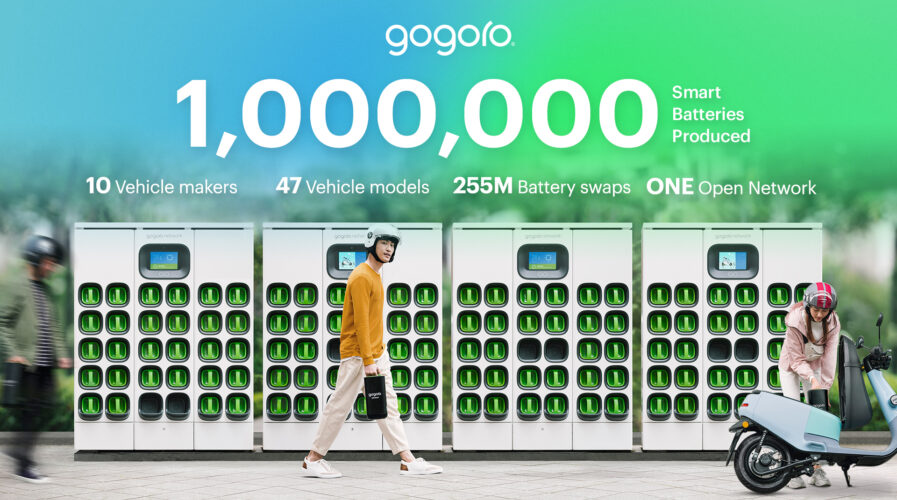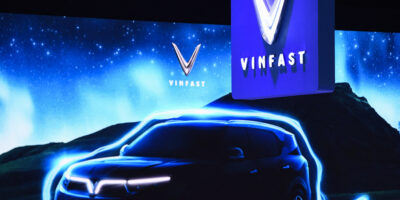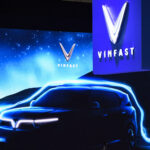
Gogoro has produced its one-millionth battery, which is a testament to the open battery swapping ecosystem. (Source – Gogoro)
Can EV battery swapping solve charging problems?
- Battery swapping is common for electric two-wheelers.
- Gogoro, the world’s largest battery swapping network, has become the de facto battery swapping standard for two-wheelers in Taiwan.
- The battery make has also just produced its one-millionth battery, which is a testament to the open battery swapping ecosystem.
The EV battery market continues to grow as demand for batteries increase. With more EVs being produced, the demand for EV charging stations and EV chargers have also increased. One way of solving this problem could be the use of battery swapping.
While battery swapping has been a common feature for two-wheel vehicles and even electric auto-rickshaws in some countries, the idea of switching batteries on four-wheel automobiles is still not really ideal for most car manufacturers. Battery swapping for these vehicles help reduce the charging time needed for EV batteries.
In fact, Elon Musk once played with the idea of battery swapping for Teslas but the project did not go ahead as planned. India has plans to introduce a new policy for battery swapping to boost sales of its Evs, to meet the country’s decarbonization goals.
Over in China, Contemporary Amperex Technology Co, one of the world’s biggest battery manufacturers is now pushing for battery swapping as an alternative to charging Evs. A Bloomberg report shows that battery swapping is starting to catch on in China, especially with the surge in EV take-ups.
Meanwhile, Gogoro, the world’s largest battery swapping network, has become the de facto battery swapping standard for two-wheelers in Taiwan. Gogoro Battery Swapping currently powers 95% of the country’s EV two-wheelers. Its open battery swapping ecosystem in Taiwan also supports seven different vehicle brands and accounted for more than 25% of all two-wheelers sold in Taipei in December 2021.
Gogoro Battery Swapping is also available in China, Indonesia, and India. In Indonesia, Gogoro has partnered with ride-hailing giant Gojek while in India, the battery swapping company has partnered with Hero Motor Corp. The battery make has also just produced its one-millionth battery, which is a testament to the open battery swapping ecosystem.
According to Horace Luke, founder, chairman, and chief executive officer of Gogoro, “since launching in 2015, Gogoro has managed more than 255 million battery swaps and together with our customers have saved 384-million kg (846-million lbs) of CO2.”
“Battery swapping is emerging as a breakthrough technology that could greatly accelerate the adoption of light electric vehicles. Most importantly, battery swap networks can eliminate range anxiety, reduce upfront vehicle costs, and address consumer concerns around slow EV charging speeds and battery obsolescence and reliability,” commented Ryan Citron, Senior Research Analyst at Guidehouse Insights.
Gogoro Network battery swapping has demonstrated interoperable success by enabling multiple generations of batteries, swapping stations, and vehicles to integrate and work together. For example, Gogoro’s first batteries from 2015 can work on its latest vehicles and can integrate across different generations of GoStations.
Gogoro established the Powered By Gogoro Network (PBGN) program to help vehicle makers accelerate the development of electric two-wheel vehicles that integrate with Gogoro Network battery swapping. The Gogoro Development Kit (GDK) provides vehicle partners with access to its intelligent drivetrains and controllers, components, and smart systems.
As Gogoro continues to develop its EV battery ecosystem, it will be interesting to see if the battery maker does make a move towards enabling battery swapping for larger EVs in the future.
READ MORE
- Strategies for Democratizing GenAI
- The criticality of endpoint management in cybersecurity and operations
- Ethical AI: The renewed importance of safeguarding data and customer privacy in Generative AI applications
- How Japan balances AI-driven opportunities with cybersecurity needs
- Deploying SASE: Benchmarking your approach


